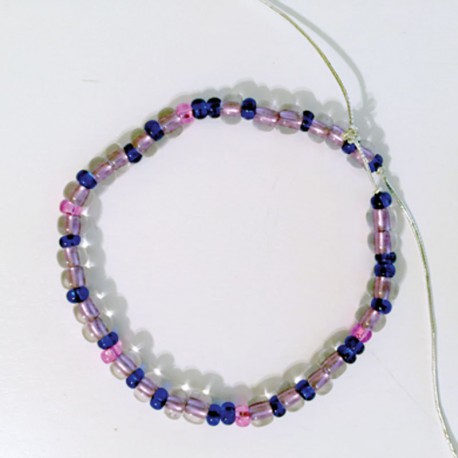 View larger
View larger
Binary Bead Craft: Bracelet (or Necklace) Version
New activity
Write your own name or nickname in binary code using beads on a bracelet.
Open Activity
How-to Video
-
Rating
-
Participants Enjoyed the ActivityParticipants Learned from This ActivityActivity Instructions Were Clear and Easy to FollowWould Recommend
Related Programming Resources
| Hints for uses in your library |
This craft has been successfully adapted for library programs for children and teens. Make sure to provide a copy of the binary key to each participant. Have a third bead color to use as a separator between letters. Shorten this activity by translating initials or brief words instead of the participants' names. It's a good idea to have extra materials, in case the participants would like to make necklaces with their full names or a phrase.
Learning about binary code can be fun, fashionable, and accessible! To make this one accessible, try providing a variety of textured or sizes of beads. It is harder for children with visual impairments to feel the different patterns if all the beads are the same size and texture. Having different textures or sizes can also help those who can see determine differences in the code better. Note: There is a pin option, but it would be recommended for tweens or teens. By Lisa Hellman Wolfner Talking Book and Braille Library Lisa.Hellman@sos.mo.gov |
| Related Links |
The State of Girls and Women in STEM, March 2018
Binary Bracelets Binary number facts for kids Binary Numbers Binary Numbers Lesson Plan What's the secret code for talking to spacecraft? What's Binary Code? How do we talk to machines? Speaking in Phases – binary code Space Based Astronomy Educator Guide A STREAM OF 1'S AND 0'S BINARY PINS Representing Numbers and Letters with Binary: Crash Course Computer Science |
| Originating Source | Developed by the Chandra X-ray Center, at the Smithsonian Astrophysical Observatory, in Cambridge, MA, with funding by NASA under contract NAS8-03060 |
| Related Books [Suggest a book] |
Technology: Cool Women Who Code by Andi Diehn and Lena Chandhok
Profiles of women in technology bring computer-related fields to life for teens. Questions ask the reader to consider societal and personal implications of different career choices. QR codes link to online
Check out these other kid friendly books about coding: Help your kids with computer coding : a unique step-by-step visual guide, from binary code to building games by Carol Vorderman, Jon Woodcock and Sean McManus Computer coding by Jon Woodcock and Steve Setford My first coding book by Kiki Prottsman and Molly Lattin How to Code a Sandcastle by Josh Funk Hello Ruby : adventures in coding by Linda Liukas How to code : a step-by-step guide to computer coding by Max Wainewright How To Be A Coder: Learn to Think Like a Coder with Fun Activities, Then Code in Scratch 3.0 Online! by Kiki Prottsman Girls who code : learn to code and change the world by Reshma Saujani; Andrea Tsurumi Kids can code! : fun ways to learn computer programming by Ian Garland |
Reviews
Easy Passive Program Activity
I set this up as a passive program in our public library Teen Zone. The teens thought learning bianary code was really cool and enjoyed making bracelets/necklaces/lanyards out of their names. Thanks!
Easy hands on non-tech tech
We did this at our library as part of our weekly "Tinker Tuesday" program for school aged children. The older kids enjoyed it (I think the PLUR factor of the pony beads helped) and liked learning about binary. We also had a few pre-K kids join in, and their parents helped. 1-4 first graders didn't seem too interested, however. To save time in working with a large group and a wide variety of ages we used pipe cleaners instead of string, so we didn't have to worry about tying knots or the beads sliding off. Would recommend for tweens.



